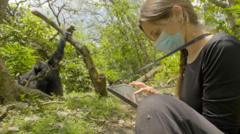Chimpanzees in Uganda have recently made headlines for their intriguing use of forest resources as a form of 'first aid'. A study conducted by researchers from the University of Oxford, in collaboration with a local team in Budongo Forest, documented instances where chimpanzees utilized medicinal plants for treating injuries and wounds on themselves and occasionally on one another.
The research supports previous findings that chimpanzees and other primates, such as orangutans and gorillas, are capable of self-medication. Published in the journal Frontiers in Ecology and Evolution, the study draws from decades of observations, showcasing the variety of ways in which these primates utilize their natural surroundings for maintaining health.
Lead researcher Elodie Freymann highlighted the complex behavioral strategies employed by chimpanzees to treat ailments and maintain hygiene. Examples include the application of certain plants to wounds or chewing plant materials before applying them to injuries. Remarkably, footage revealed a young female chimp caring for an open wound on her mother's body and instances of chimps aiding unrelated individuals, suggesting a level of empathy among these intelligent animals.
Freymann and her colleagues analyzed anecdotal evidence from a logbook dating back to the 1990s, which chronicled unique behaviors observed by field staff and visitors in Budongo Forest. Some entries noted chimps using leaves for personal hygiene, further underlining the sophistication of their behavioral repertoire.
Building on earlier findings regarding the medicinal properties of plants consumed by injured chimpanzees, the researchers confirmed that many of these plants possess antibacterial characteristics. This knowledge may prove useful in future medicinal research aimed at identifying new treatments.
The insights gained from observing the self-care strategies of chimpanzees not only enhance our understanding of their intelligence and adaptability but also illuminate the deep connection between these primates and their natural habitat. Dr. Freymann emphasized that the survival of chimpanzees in their wild environment hinges on their knowledge of local resources, which is something humans could learn from as we continue to explore the interplay between nature and healing.
The research supports previous findings that chimpanzees and other primates, such as orangutans and gorillas, are capable of self-medication. Published in the journal Frontiers in Ecology and Evolution, the study draws from decades of observations, showcasing the variety of ways in which these primates utilize their natural surroundings for maintaining health.
Lead researcher Elodie Freymann highlighted the complex behavioral strategies employed by chimpanzees to treat ailments and maintain hygiene. Examples include the application of certain plants to wounds or chewing plant materials before applying them to injuries. Remarkably, footage revealed a young female chimp caring for an open wound on her mother's body and instances of chimps aiding unrelated individuals, suggesting a level of empathy among these intelligent animals.
Freymann and her colleagues analyzed anecdotal evidence from a logbook dating back to the 1990s, which chronicled unique behaviors observed by field staff and visitors in Budongo Forest. Some entries noted chimps using leaves for personal hygiene, further underlining the sophistication of their behavioral repertoire.
Building on earlier findings regarding the medicinal properties of plants consumed by injured chimpanzees, the researchers confirmed that many of these plants possess antibacterial characteristics. This knowledge may prove useful in future medicinal research aimed at identifying new treatments.
The insights gained from observing the self-care strategies of chimpanzees not only enhance our understanding of their intelligence and adaptability but also illuminate the deep connection between these primates and their natural habitat. Dr. Freymann emphasized that the survival of chimpanzees in their wild environment hinges on their knowledge of local resources, which is something humans could learn from as we continue to explore the interplay between nature and healing.



















